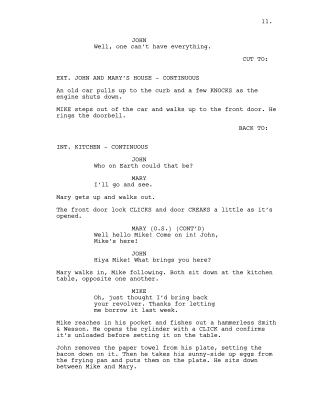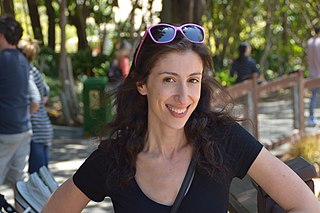Related Research Articles

William Goldman was an American novelist, playwright, and screenwriter. He first came to prominence in the 1950s as a novelist before turning to screenwriting. Among other accolades, Goldman won two Academy Awards in both writing categories—once for Best Original Screenplay for Butch Cassidy and the Sundance Kid (1969) and once for Best Adapted Screenplay for All the President's Men (1976).

A screenwriter is a writer who practices the craft of screenwriting, writing screenplays on which mass media, such as films, television programs, and video games, are based.
A screenplay, or script, is a written work by screenwriters for a film, television show, or video game. A screenplay written for television is also known as a teleplay. Screenplays can be original works or adaptations from existing pieces of writing. A screenplay is a form of narration in which the movements, actions, expressions and dialogue of the characters are described in a certain format. Visual or cinematographic cues may be given, as well as scene descriptions and scene changes.
Filmmaking or film production is the process by which a motion picture is produced. Filmmaking involves a number of complex and discrete stages, beginning with an initial story, idea, or commission. Production then continues through screenwriting, casting, pre-production, shooting, sound recording, post-production, and screening the finished product before an audience, which may result in a film release and exhibition. The process is nonlinear, as the director typically shoots the script out of sequence, repeats shots as needed, and puts them together through editing later. Filmmaking occurs in a variety of economic, social, and political contexts around the world, and uses a variety of technologies and cinematic techniques to make theatrical films, episodic films for television and streaming platforms, music videos, and promotional and educational films.

Screenwriting or scriptwriting is the art and craft of writing scripts for mass media such as feature films, television productions or video games. It is often a freelance profession.

Donald Paul Roos is an American screenwriter and film director.

Terry Rossio is an American screenwriter and film producer. He co-wrote the films Aladdin, Shrek, and all five of the Pirates of the Caribbean series. He was nominated for the Academy Award for Best Adapted Screenplay for Shrek, and won the Annie Award for Writing in a Feature Production, as well as the BAFTA Award for Best Adapted Screenplay for Shrek. He often collaborates with fellow screenwriter Ted Elliott.

Carl Foreman, CBE was an American screenwriter and film producer who wrote the award-winning films The Bridge on the River Kwai and High Noon, among others. He was one of the screenwriters who were blacklisted in Hollywood in the 1950s because of their suspected communist sympathy or membership in the Communist Party.

Robert McKee is an author, lecturer and story consultant who is known for his "Story Seminar", which he developed when he was a professor at the University of Southern California. McKee is the author of Story: Substance, Structure, Style and the Principles of Screenwriting, Dialogue: the Art of Verbal Action for Stage, Page and Screen, Storynomics: Story-Driven Marketing in the Post-Advertising World and Character: The Art of Role and Cast Design for Page, Stage, and Screen. McKee also has the blog and online writers' resource "Storylogue".

Austin Film Festival (AFF), founded in 1994, is an organization in Austin, Texas, that focuses on writers' creative contributions to film. Initially, AFF was called the Austin Heart of Film Screenwriters Conference and functioned to launch the careers of screenwriters, who historically have been underrepresented within the film industry.
Randi Mayem Singer is an American screenwriter, producer and showrunner best known for writing the screenplay to the 20th Century Fox blockbuster comedy Mrs. Doubtfire starring Robin Williams and Sally Field.
Robin Stender Swicord is an American screenwriter, film director, and playwright, best known for literary adaptations. Her notable screenplays include Little Women (1994), Matilda (1996), Practical Magic (1998), Memoirs of a Geisha (2005), and The Curious Case of Benjamin Button (2008), the latter of which was nominated for the Academy Award for Best Adapted Screenplay and the Golden Globe Award for Best Screenplay. She wrote and directed the 2007 film The Jane Austen Book Club.

Dreams on Spec is a 2007 American documentary film that profiles the struggles and triumphs of emerging Hollywood screenwriters. It was written and directed by Daniel J. Snyder, who learned first-hand about the screenwriter's travails in the late 1980s when he was a teenager working alongside aspiring writer/directors Quentin Tarantino and Roger Avary in the famed Video Archives video store in Manhattan Beach, California.
Blake Snyder was an American screenwriter, consultant, author and educator based in Los Angeles. His screenplays include the comedies Stop! Or My Mom Will Shoot (1992) and Blank Check (1994).
A script market is the system in which a screenwriter and producer engage in the buying and selling of a script for the film and television industries. The process of selling a script may begin with the pitch, however since the end of the 1980s the ability to pitch a film to producers has greatly depended on the notoriety of the screenwriter. One reason attributed to this effect is that studios are looking for the next big hit, but scared to take a chance on a script that doesn’t meet a pre-established formula guaranteed to make money since no one knows what will work. The majority of scripts are read by studio interns and others, who give the scripts a “consider”, “pass”, or “recommend” status, with most scripts receiving a “pass” rating. However, an agent who's signed the Artists-Managers Agreement drawn up by the Writers Guild of America can submit scripts to producers directly. Agents try to create buzz in the script market using spec script. With everyone in the entertainment industry trying to pursue the million-dollar dream, and Hollywood so desperate for new material ideas, the script market functions and business practices have been pursued in the spec script manner.
Diane Drake is an American screenwriter and teacher, and former Vice President of Creative Affairs for Sydney Pollack's production company, Mirage Enterprises. She lives in Los Angeles and is best known for the films Only You and What Women Want.
Michael H. Weber is an American screenwriter and producer. He and his writing partner, Scott Neustadter, are best known for writing the screenplay for the romantic comedy film 500 Days of Summer. The film is based on two real relationships Neustadter had. They also wrote the screenplays for the film adaptations of the novels The Spectacular Now, The Fault in Our Stars, and Paper Towns.
Craig Borten is an American screenwriter. Borten is best known for his Oscar-nominated script for the 2013 film Dallas Buyers Club. In addition to his nomination for Academy Award for Best Original Screenplay, Borten also received a nomination for Writers Guild of America Award for Best Original Screenplay.
Ken Nolan is an American screenwriter and novelist best known for adapting the 2001 biographical war film Black Hawk Down from the non-fiction book of the same name.

Savion Einstein is an Israeli screenwriter and producer. The daughter of the late sports broadcaster Meir Einstein, she has written numerous advertisements and screenplays. Her work has been recognised with several honours, including a Joplin Award and a nomination for the Nicholl Fellowships in Screenwriting. In 2018, her screenplay Superfecundation was sold to Sony's production company Screen Gems.
References
- 1 2 3 Heidenry, Margaret (March 2013). "When the Spec Script Was King". Vanity Fair .
- 1 2 3 4 Trottier, David R. (2014). The screenwriter's bible: a complete guide to writing, formatting, and selling your script (6th ed.). Silman-James Press. ISBN 9781935247104.
- ↑ Brady, John (1981). The Craft of the Screenwriter . p. 204.
- 1 2 Field, Syd (2005). Screenplay : the foundations of screenwriting (Rev. ed.). Delta Trade Paperbacks. pp. 297–304. ISBN 9780385339032.